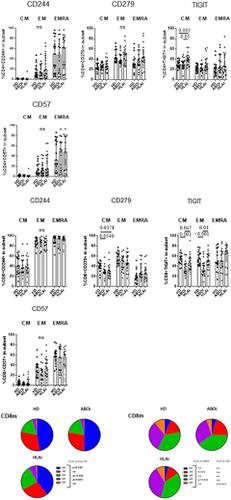当前位置:
X-MOL 学术
›
Clin. Exp. Immunol.
›
论文详情
Our official English website, www.x-mol.net, welcomes your
feedback! (Note: you will need to create a separate account there.)
T cell reconstitution after lymphocyte depletion features a different pattern of inhibitory receptor expression in ABO- versus HLA-incompatible kidney transplant recipients.
Clinical & Experimental Immunology ( IF 3.4 ) Pub Date : 2020-01-23 , DOI: 10.1111/cei.13412 A Del Bello 1, 2, 3 , N Kamar 1, 2, 3 , E Treiner 2, 3, 4
Clinical & Experimental Immunology ( IF 3.4 ) Pub Date : 2020-01-23 , DOI: 10.1111/cei.13412 A Del Bello 1, 2, 3 , N Kamar 1, 2, 3 , E Treiner 2, 3, 4
Affiliation

|
Chronic antigen stimulation can lead to immune exhaustion (a state of T cell dysfunction). Several phenotypical signatures of T cell exhaustion have been described in various pathological situations, characterized by aberrant expression of multiple inhibitory receptors (IR). This signature has been barely studied in the context of allogenic organ transplantation. We undertook a cross‐sectional analysis of the expression of IR [CD244, CD279, T cell immunoreceptor with immunoglobulin (Ig) and immunoreceptor tyrosine‐based inhibition motif (ITIM) domains (TIGIT) and CD57] and their correlation with cytokine‐producing functions in T cells reconstituting after lymphocyte depletion in patients transplanted from living donors, with preformed donor‐specific antibodies. After ABO incompatible transplantation, T cells progressively acquired a phenotype similar to healthy donors and the expression of several IR marked cells with increased functions, with the exception of TIGIT, which was associated with decreased cytokine production. In stark contrast, T cell reconstitution in patients with anti‐human leukocyte antigen (HLA) antibodies was characterized with an increased co‐expression of IR by T cells, and specifically by an increased expression of TIGIT. Furthermore, expression of these receptors was no longer directly correlated to cytokine production. These results suggest that T cell alloreactivity in HLA‐incompatible kidney transplantation drives an aberrant T cell reconstitution with respect to IR profile, which could have an impact on the transplantation outcome.
中文翻译:

淋巴细胞耗竭后的T细胞重构在ABO和HLA不相容的肾移植受者中具有不同的抑制性受体表达模式。
慢性抗原刺激可导致免疫力衰竭(T细胞功能障碍的一种状态)。已经在各种病理情况下描述了T细胞衰竭的几种表型特征,其特征在于多种抑制性受体(IR)的异常表达。在同种异体器官移植的背景下,几乎没有研究过这种签名。我们对IR的表达进行了横断面分析[CD244,CD279,带有免疫球蛋白(Ig)和基于酪氨酸的免疫受体酪氨酸抑制基序(ITIM)和CD57的T细胞免疫受体]及其与细胞因子产生功能的相关性从活体供体移植的患者中,用预先形成的供体特异性抗体在淋巴细胞耗竭后重建的T细胞中的表达 ABO不兼容移植后,T细胞逐渐获得与健康供体相似的表型,并具有一些功能增强的IR标记细胞的表达,但TIGIT除外,这与细胞因子的产生减少有关。与之形成鲜明对比的是,抗人白细胞抗原(HLA)抗体患者的T细胞重构的特征是T细胞对IR的共表达增加,特别是TIGIT表达增加。此外,这些受体的表达不再与细胞因子的产生直接相关。这些结果表明,在不兼容HLA的肾脏移植中,T细胞的同种异体反应会导致IR谱的异常T细胞重构,这可能会对移植结果产生影响。
更新日期:2020-03-26
中文翻译:

淋巴细胞耗竭后的T细胞重构在ABO和HLA不相容的肾移植受者中具有不同的抑制性受体表达模式。
慢性抗原刺激可导致免疫力衰竭(T细胞功能障碍的一种状态)。已经在各种病理情况下描述了T细胞衰竭的几种表型特征,其特征在于多种抑制性受体(IR)的异常表达。在同种异体器官移植的背景下,几乎没有研究过这种签名。我们对IR的表达进行了横断面分析[CD244,CD279,带有免疫球蛋白(Ig)和基于酪氨酸的免疫受体酪氨酸抑制基序(ITIM)和CD57的T细胞免疫受体]及其与细胞因子产生功能的相关性从活体供体移植的患者中,用预先形成的供体特异性抗体在淋巴细胞耗竭后重建的T细胞中的表达 ABO不兼容移植后,T细胞逐渐获得与健康供体相似的表型,并具有一些功能增强的IR标记细胞的表达,但TIGIT除外,这与细胞因子的产生减少有关。与之形成鲜明对比的是,抗人白细胞抗原(HLA)抗体患者的T细胞重构的特征是T细胞对IR的共表达增加,特别是TIGIT表达增加。此外,这些受体的表达不再与细胞因子的产生直接相关。这些结果表明,在不兼容HLA的肾脏移植中,T细胞的同种异体反应会导致IR谱的异常T细胞重构,这可能会对移植结果产生影响。










































 京公网安备 11010802027423号
京公网安备 11010802027423号